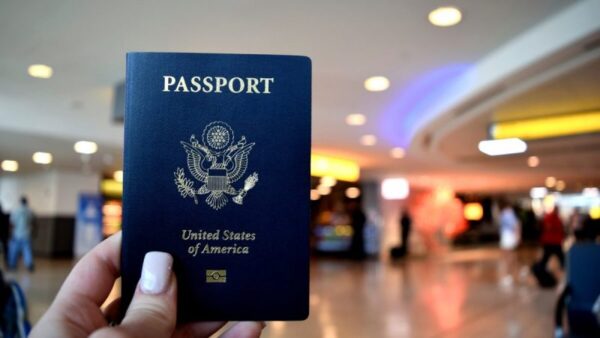The United States, once a perennial leader in global passport rankings, has seen its position slip in the 2025 Henley Passport Index (HPI).
This year, the U.S. passport ranks 8th, offering visa-free access to 186 destinations, a notable decline from its previous top-tier rankings.
While the U.S. passport remains one of the most powerful in the world, this drop highlights a shift in global mobility and raises questions about the factors contributing to this change.
Decline in Global Mobility
The U.S. passport has long been considered one of the most coveted travel documents globally. For years, it granted U.S. citizens unparalleled access to countries around the world, with minimal visa requirements.
However, the 2025 rankings reveal that countries such as Singapore, Germany, and Japan now enjoy stronger passport power, with citizens from these nations able to travel to 192 or more destinations without a visa.
So, what has led to this shift in rankings for the United States?
1. Increased Visa Restrictions
One of the primary factors affecting the U.S. passport’s standing is the tightening of visa requirements for certain countries.
Despite its strong international presence, the U.S. has imposed more complex visa issuance processes and restrictions in recent years, especially in the wake of heightened security concerns and changing immigration policies.
This, in turn, has made travel for American citizens less flexible in comparison to nations that have pursued more liberal visa agreements.
Countries like Japan and Singapore have significantly strengthened their global mobility by forging comprehensive visa-waiver arrangements and diplomatic ties with various countries.
In contrast, the U.S. has seen an increase in the number of nations where its passport holders need visas, especially for travel to emerging markets or regions with complex geopolitical relations.
2. Shifting Diplomatic Relations
Global politics and diplomatic relations play a crucial role in determining passport strength, and the U.S. is experiencing a period of diplomatic shift.
The country’s international standing has evolved, with a changing landscape of alliances, trade relations, and foreign policy.
These factors can affect the ease with which U.S. citizens can travel to certain countries, particularly in regions such as Africa, the Middle East, and parts of Asia.
While the U.S. maintains strong ties with many countries, it has faced growing tensions in some regions.
These changes in diplomatic relations may contribute to a reduced number of visa-free destinations for U.S. citizens compared to other countries, which have been actively working to broaden access for their citizens.
3. Rise of Stronger Competitors
Another key factor behind the U.S. passport’s slip is the rise of countries that have rapidly expanded their global mobility.
Nations like Singapore, Japan, and several European Union members have significantly strengthened their passports by negotiating more visa-waiver agreements and fostering closer international cooperation.
\These countries’ proactive diplomatic strategies have positioned their passports among the top ranks, edging out the U.S. in the process.
Singapore, in particular, has made significant strides by securing agreements with a wide range of nations, securing the number-one position for the second consecutive year.
Similarly, European Union countries such as Germany, France, and Spain offer near-universal access to global destinations, placing them firmly in the top tier of passport strength.
The U.S. Position: Still Among the World’s Best
Despite the shift, the U.S. passport remains an elite travel document, with access to 186 countries, and it still holds a significant advantage over many other passports globally.
It is ranked alongside powerful nations such as the United Kingdom, Switzerland, and Canada, which also offer excellent global mobility.
However, this decline highlights a broader trend in global mobility: the increasing competitiveness of passports worldwide.
Nations that have focused on improving diplomatic relations and expanding travel freedom for their citizens are outpacing traditional powers like the United States. As the U.S. faces an increasingly complex global landscape, it will need to consider how best to maintain its position in future rankings.
Conclusion
The U.S. passport’s drop to 8th place in the 2025 Henley Passport Index marks a notable shift in global mobility trends. While the U.S. continues to rank highly, the rise of other nations in the rankings and the changing geopolitical dynamics are reshaping the global passport landscape.
With countries like Singapore, Japan, and several EU members leading the way, the U.S. will have to navigate these changes to maintain its competitive edge in global travel.
For now, U.S. passport holders can still enjoy substantial travel freedom, but the gap between them and the world’s most mobile citizens has certainly narrowed.
Also Read
Top Ten Strongest Passports in 2025 According to the Henley Passport Index
VietJet Boosts Capacity for Lunar New Year Travel with Fleet Expansion

